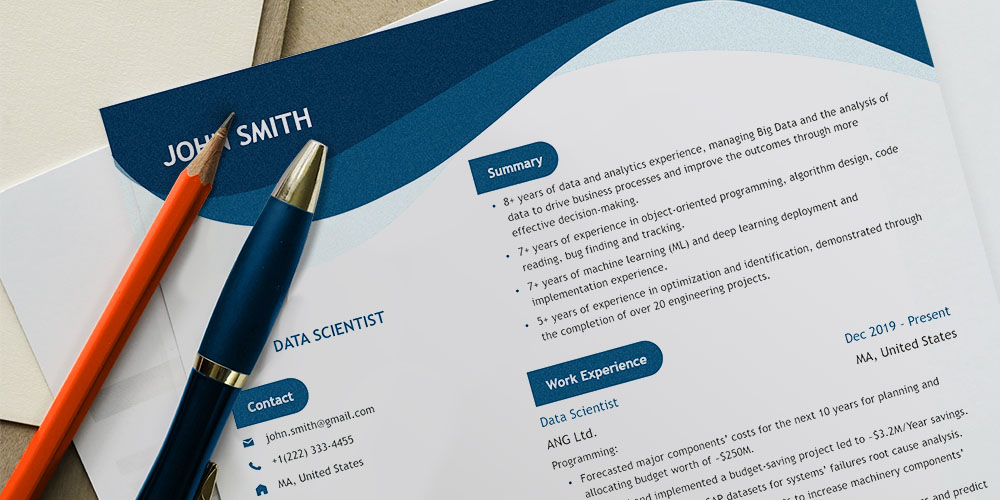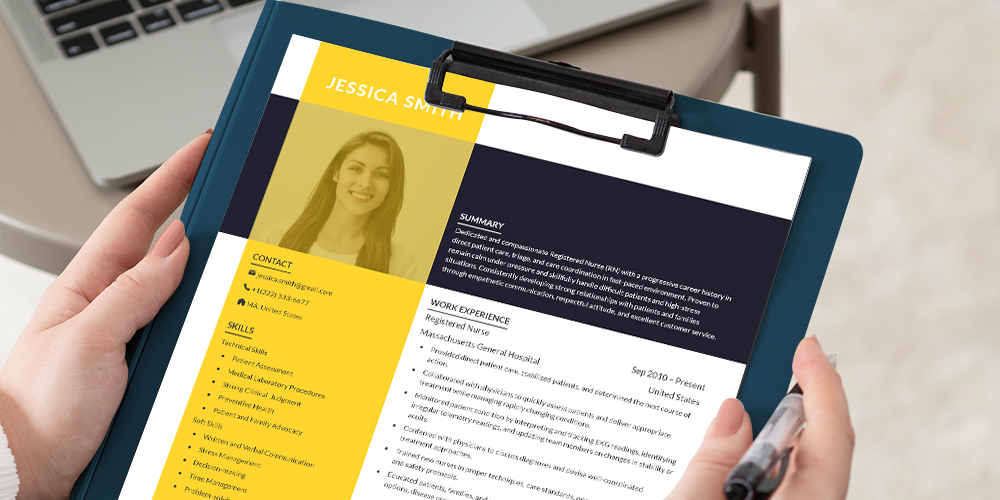
A strong and relevant skills section is an important part of your resume as it gives hiring managers a complete snapshot of your abilities that proves you are qualified.
According to recent reports, most HR professionals stated a shortage of skills in applicants for job openings. But do you understand what exactly they mean by skill?
Skills are the innate talents and expertise you develop to perform a job or a task. You must know that there are several types of skills, including soft skills, hard skills, domain-general, and domain-specific skills.
If you do not know how to write a resume skill section or what a skill section of a resume looks like, Radviser, your intelligent adviser, is here to explain how to put skills on your resume with plenty of practical examples to help you create the perfect skills section.

Keys to Write an Effective Resume Skills Section
By learning how to present your skills on your resume, you will increase your chance of landing interviews because this way, employers can see if you match the requirements. There are three keys to writing a thorough skills section on your resume:
- Knowing the best ways to list skills that impress hiring managers.
- Choosing a skills section format that fits your resume
- Understanding what the most relevant skills for your resume are.
Why Do I Need Skills on My Resume?
Keeping your resume concise will allow a recruiter or hiring manager to figure out the value you could create for the company after a quick skim. With this in mind, having a specific section that spells out your skills makes a lot of sense. This section is redundant, and ideally, a close read of your experiences should get across all your hard and soft skills. But the most important reason for the skills section is that a resume so rarely gets a close read on a first pass. Typically, recruiters spend about 6 seconds on a resume. You never know what kind of reader you'll get; you need to cover your bases and put your skills in bullet points. Note that keyword scanning is another applicant tracking system for resumes if one wants to review it. The skills section needs to be filled with relevant keywords.
resume_1_dark_banner
How to Write a Resume Skill Section?
The following steps will help you find the best skills to put on your resume skills sections.
1. Brainstorm Your Expertise and Skills
Everybody has their own distinct set of marketable skills. Make a list of your skills, and then decide which abilities are relevant to the job you want to apply for. Hard skills can be learned in schools, mastered on a job, and picked up through volunteer work or extracurricular activities. Soft skills describe your personality, and you can add these skills to your resume only to round out your skills sections. Organize your hard and soft skills and put a relevant combination of them in your skills section.
2. Review the Job Ad
To have a solid answer to how to write a resume skills section, you can list skills relevant to the role mentioned in the job posting. Both job ads and job descriptions can be a great source for listing the most valuable skills. When you carefully check the description and requirements, you will find out that some of your skills will match the ones in the ad, and others will not be entirely related. This way, you can indicate how your skills can help you do the job by providing more information in the work history section. Keep in mind that the number of hard and soft skills you list should differ depending on the industry. For an engineering role, hard/technical skills are more important, and for a bartender, soft skills are more crucial.
3. Go Online and Get More Ideas
If you still need skills to put on your resume skills section, go online and search for more ideas. You can look at the LinkedIn page of employees working in similar roles at the job you are applying for and check out the common skills to add to your resume.
Other job ads for similar roles like the one you are applying for can also help you use related keywords and skills on your resume.
Note: Cut the irrelevant skills. When you list your skills and check the job, decide which skills to put on your resume. Based on the role, you need to emphasize different soft or hard skills once the list is narrowed down to write the best skills section on your resume.

How Many Skills to Include on My Resume and Where to List Them?
The number of skills you put on your resume is up to you. Since your resume's skills section has limited space, each skill you list should be related to the job role, or else your resume will be eliminated. Mainly, there are three types of skills sections you can use to highlight your essential expertise and abilities, including
- Additional Skills Section
- Technical Skills Section
- Relevant Skills Section
Follow the rest of this article to learn how to write a resume skills section way better than your competitors.
1. Additional Skills Section
An additional skills section is a standard component of a professional resume. It can be seen on most resume templates. The skills section should be small on a traditional, classic, and chronological resume. The work experience part should take up the most space. Since you are using your experience section to showcase your skill-based accomplishments on the resume, you can rely on the work history part to market the skills and abilities you own. You can put from three to eight relevant skills in the skills section, and each of them can be a strong reason you are the perfect hire. Some say this is best for entry-level positions, customer-focused jobs, and career change resumes as well.
2. Technical Skills Section
If the skill set is equally as necessary as the work experience, you need a dedicated technical skills section to wow hiring managers by highlighting these powers. A technical skills section needs to be more prominent, and it should be paired with an additional skills section. This part can be a great section for jobs that require technical abilities, applicants with years of experience, and candidates in marketing, research labs, medical, and IT sectors.
3. Relevant Skills Section
A relevant skills section is mostly used on a functional resume to downplay the work experience you mentioned, especially if you have work history gaps or changing industries. This section allows you to demonstrate how your achievements helped you develop specific skills. This section must be longer than the work experience section. It can be perfect for job seekers transferring industries, gaps in their work history, and workers with skills they desire to detail in depth.
resume_1_light_banner
What Skills to Put on My Resume Skills Section?
If you still do not know how to write a resume skills section, consider using the following items:
1. Transferable Skills
Transferable skills are those that are used in different industries. These skills are mostly used on career change resumes. It is better to add a cover letter related to your career change, explain why you are trying to change industries and reassure hiring managers you are the best fit.
- Transferable Hard Skills
You can list skills like language fluency, computer skills (G Suit, HTML, Microsoft Skills, Cloud Management), writing skills (Copywriting, Blogging, Technical Writing), spreadsheets (Google Sheets, Excel), and marketing abilities (Google Analytics, Google AdWords, SEO).
- Transferable Soft Skills
Most soft skills are transferable, and they can be used in various resumes. Some key transferable soft skills include leadership skills (Delegation, Problem-solving, Conflict Resolution), organizational skills (Scheduling, Dependability, Goal Setting), and management skills (Mentoring, Public Speaking, Forecasting).
2. Industry-Specific Skills
Based on the field and industry you are applying to, you need to mention industry-specific skills in your resume. Most industry skills are hard skills, but some jobs require even more well-developed soft skills than others.
Read More: How to Write a Cover Letter?

What Shouldn't I Do with Job Skills on My Resume?
Here is a recap of things to avoid doing with your resume skills section:
1. Do Not Lie or Exaggerate
Control the temptation to inflate a job role, add certification and skills you do not have, or embellish a tenure that did not last as long as you mentioned. False claims or stretching the truth is not worth the risk since there is something called a background check in case you have forgotten. Companies can call references, and falsehoods will damage your professional character.
2. Do Not Leave out Numbers
You must try not to be vague and try to quantify your value. If you increase sales, reach new markets, reduce expenses, etc., all those accomplishments involve numbers that must be used in your resume.
3. Be Careful with the Words
Review your resume for wordiness. If a section is short, you might get tempted to ramble on and on, but you must be careful with the words and do not misuse them. Remember to avoid resume cliches like outside of the box, or synergize, etc.
4. Proofread the Resume
Before you send in the prepared resume, review it for spelling, grammar, formatting issues, etc., you can also ask someone to look it over for you. You can check a printed copy for easier editing as it makes it more simple to catch errors.

Final Words
Your resume skills list shows hiring managers that you are the best candidate for the role and bring specified value to their team. You can stand out from the competition by paying attention to the ad description and job requirements and making connections to your abilities and strengths.
In this article, we tried to go over the most important thing about how to write a resume skills section. This part must be small, and it should pack a list of your top skills if you would like to hear back from hiring managers. Customize the skills section for the position you are applying to, provide a trustworthy combination of hard/soft skills, and ensure that the rest of the resume shows your mentioned skills in action. Do not forget about the power of cover letters that can further emphasize your skill-set. A cover letter gives you a chance to tell a richer story of how you have excelled with those skills in the past. If you are curious to know how to write a cover letter with vivid tips and examples, go through Radviser Library and refresh your knowledge right away.












